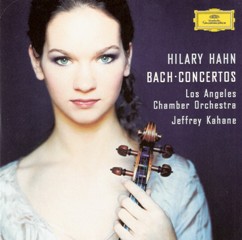111 Years of Deutsche Grammophon - CD 23
111 Years of Deutsche Grammophon - CD 23
Bach, J.S.: Violin Concertos Nos.1 & 2; Double Concerto

Violin Concerto No.2 in E, BWV 1042 1 1. Allegro [6:55] 2 2. Adagio [7:07] 3 3. Allegro assai [2:25] Concerto for 2 Violins, Strings, and Continuo in D minor, BWV 1043 4 1. Vivace [3:14] 5 2. Largo ma non tanto [6:50] 6 3. Allegro [4:13] Violin Concerto No.1 in A minor, BWV 1041 7 1. (Allegro moderato) [3:24] 8 2. Andante [6:45] 9 3. Allegro assai [3:21] Concerto for 2 Harpsichords, Strings, and Continuo in C minor, BWV 1060 Arr. for violin, oboe strings & continuo 10 1. Allegro [4:31] 11 2. Adagio [5:20] 12 3. Allegro [3:14] Hilary Hahn – violin Allan Vogel - oboe Los Angeles Chamber Orchestra Margaret Batjer – concertmaster Jeffrey Kahane – harpsichord, conductor
The Violin Concerto in A minor, BWV 1041, was composed by Johann Sebastian Bach in 1748. The motifs of the theme of the Allegro moderato appear in changing combinations and are separated and intensified throughout the movement. In the Andante Bach uses an insistent pattern in the bass part that is repeated constantly in the movement. He focuses the variation in the harmonic relations. In the final movement Bach relies on bariolage figures to generate striking acoustic effects.
Violin Concerto in E, BWV1042, along with Bach's other surviving violin concerto, was composed during his stint in the service of the Prince of Anhalt-Cöthen. J.N. Forkel, Bach's original biographer, describes the concerto as being "full of an unconquerable joy of life, that sings in the triumph of the first and last movements."
The Concerto for 2 Violins, Strings and Continuo in D Minor, BWV 1043, also known as the Double Violin Concerto or "Bach Double", is perhaps one of the most famous works by J. S. Bach and considered among the best examples of the work of the late Baroque period. Bach wrote it between 1730 and 1731 when he was the cantor at Thomasschule, in Leipzig, Germany. Later in 1739, in Leipzig, he created an arrangement for two harpsichords, transposed into C minor, BWV 1062. In addition to the two soloists, the concerto is scored for strings and basso continuo. The concerto is characterized by the subtle yet expressive relationship between the violins throughout the work. The musical structure of this piece uses fugal imitation and much counterpoint.
The harpsichord concertos, BWV 1052-1065, are concertos for harpsichord, strings and continuo by Johann Sebastian Bach. There are seven complete concertos for a single harpsichord, (BWV 1052-1058), three concertos for 2 harpsichords (BWV 1060-1062), two concertos for 3 harpsichords (BWV 1063-1064), and one concerto for 4 harpsichords, (BWV 1065). Two other concertos include solo harpsichord parts: the concerto BWV 1044, which has solo parts for harpsichord, violin and flute, and Brandenburg concerto no.5, BWV 1050, with the same scoring. In addition there is a single 9-bar concerto fragment for a single harpsichord (BWV 1059) which adds an oboe to the strings and continuo. All of Bach's harpsichord concertos (with the exception of the Brandenburg concerto) are thought to be arrangements made from earlier concertos for melodic instruments probably written in Köthen. In many cases, only the harpsichord version has survived.








